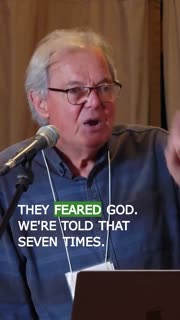Exodus: Identity, Faith, and God's Transformative Presence
Devotional
Sermon Summary
Bible Study Guide
Sermon Clips
1) "Of course, the name doesn't mean anything without the presence, and you probably know that. There's no point coming to church if God's presence is not here. You'll come to this later in the Exodus after the golden calf incident. Things get sorted out, and God says, well, you know what, you're a stiff-necked people. I can't go with you. And Moses says, what? If you're not coming with us, we don't want the land. No presence, no deal. It's the same with church, folks. If God is not present, we're wasting our time. It's really about his presence, and that's what the Exodus celebrates. And as a consequence of that, God wants to teach us how to be truly human, how to live." [05:19] (35 seconds)
2) "You cannot be Canadian and follow Jesus. You can't be Australian. Well, everyone knows that. the point is you can only have one identity. And I think the reason why. So many Christians struggle is because we can't work out who we are yet. On the one hand, you know, we're trying to be this Canadian person. On the other hand, this kind of supreme business person or something like that. Or the most beautiful woman in the world, whatever that kind of stuff is. If you're a Pentecostal, it's all about experience. And occasionally there's scripture in there. No wonder we're psychotic cases. This is now our history. Forgive me, but Canada Day doesn't mean much to me. But this does. This is who I am. were just singing about this. The God who did this in the past. We need you now. This is our story. That's why it matters. That's why it's worthwhile spending time in it." [11:22] (60 seconds)
3) "This is history. This stuff happened. And if it didn't, don't hang about with it. And that's been one of the problems recently. Some scholars have begun to ask for questions about this over the last maybe 100 years or so. Where's the evidence of Israel ever being in Egypt? How come there aren't things chiseled into walls, whatever? What about Sinai? They end up concluding it's really a later invention from around the time of the Exodus. And it never really happened. Now, that's actually taught in many seminaries. These people are saying it's all invention. Well, not at all. Not from Israel's point of view. There's a much longer discussion here, but it's worth noting." [13:30] (42 seconds)
4) "Justice is relational and it's all about the relationship with the Creator. That's the fundamental thing. We are made in his image. Which means we're not meant to be autonomous. What that means is life for us is not some autonomous human right actually. It's God's gift and it's dependent on us maintaining his image. If you know that image language, that's what it means when the image ends up doing its own thing just into non-existence. I can't unpack all of that. That's another thing all together. You might have covered that. I don't know. That's sometimes hard for us to understand. Why? It's my life. I can do what I please. Yep, try that and see what happens. This is the gift of Yahweh. Yes, God wants to bless us, but it's on his terms. And as you read the Exodus, you realize that he has to stand at the center of all of this. And that's where the deliverance comes out of relationship with Yahweh. It doesn't come any other way." [26:29] (67 seconds)
5) "They feared God. We're told that seven times. Egyptian midwives who fear God. What can we learn about that, folks? Just because people don't go to church doesn't mean they don't care about God. In fact, it might just be they do. And that's why they don't. They bumped up against a few Christians. Lauren Wilkinson, one of our profs, used to say, if you're running away from a false view of God, are you further from him or closer to him? Interesting thought, right? But in this account, you have the first record of civil disobedience. Where these midwives, Egyptians, not Israelites, disobey or actually dissemble in order to do the right thing. Very interesting, right? If you think about Christian morality, what you should do. And what happens? They get named, the Pharaoh doesn't, and they flourish. And later on, the Pharaoh is going to lose the firstborn. Isn't that interesting?" [30:11] (64 seconds)
Ask a question about this sermon
2) "You cannot be Canadian and follow Jesus. You can't be Australian. Well, everyone knows that. the point is you can only have one identity. And I think the reason why. So many Christians struggle is because we can't work out who we are yet. On the one hand, you know, we're trying to be this Canadian person. On the other hand, this kind of supreme business person or something like that. Or the most beautiful woman in the world, whatever that kind of stuff is. If you're a Pentecostal, it's all about experience. And occasionally there's scripture in there. No wonder we're psychotic cases. This is now our history. Forgive me, but Canada Day doesn't mean much to me. But this does. This is who I am. were just singing about this. The God who did this in the past. We need you now. This is our story. That's why it matters. That's why it's worthwhile spending time in it." [11:22] (60 seconds)
3) "This is history. This stuff happened. And if it didn't, don't hang about with it. And that's been one of the problems recently. Some scholars have begun to ask for questions about this over the last maybe 100 years or so. Where's the evidence of Israel ever being in Egypt? How come there aren't things chiseled into walls, whatever? What about Sinai? They end up concluding it's really a later invention from around the time of the Exodus. And it never really happened. Now, that's actually taught in many seminaries. These people are saying it's all invention. Well, not at all. Not from Israel's point of view. There's a much longer discussion here, but it's worth noting." [13:30] (42 seconds)
4) "Justice is relational and it's all about the relationship with the Creator. That's the fundamental thing. We are made in his image. Which means we're not meant to be autonomous. What that means is life for us is not some autonomous human right actually. It's God's gift and it's dependent on us maintaining his image. If you know that image language, that's what it means when the image ends up doing its own thing just into non-existence. I can't unpack all of that. That's another thing all together. You might have covered that. I don't know. That's sometimes hard for us to understand. Why? It's my life. I can do what I please. Yep, try that and see what happens. This is the gift of Yahweh. Yes, God wants to bless us, but it's on his terms. And as you read the Exodus, you realize that he has to stand at the center of all of this. And that's where the deliverance comes out of relationship with Yahweh. It doesn't come any other way." [26:29] (67 seconds)
5) "They feared God. We're told that seven times. Egyptian midwives who fear God. What can we learn about that, folks? Just because people don't go to church doesn't mean they don't care about God. In fact, it might just be they do. And that's why they don't. They bumped up against a few Christians. Lauren Wilkinson, one of our profs, used to say, if you're running away from a false view of God, are you further from him or closer to him? Interesting thought, right? But in this account, you have the first record of civil disobedience. Where these midwives, Egyptians, not Israelites, disobey or actually dissemble in order to do the right thing. Very interesting, right? If you think about Christian morality, what you should do. And what happens? They get named, the Pharaoh doesn't, and they flourish. And later on, the Pharaoh is going to lose the firstborn. Isn't that interesting?" [30:11] (64 seconds)





